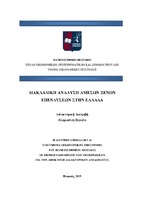Διακλαδική ανάλυση άμεσων ξένων επενδύσεων στην Ελλάδα
Sectoral analysis of foreign direct investment in Greece

View/
Keywords
Άμεσες ξένες επενδύσεις ; Οικονομετρική ανάλυση ; Foreign direct investment ; Διακλαδική ανάλυση ; Sectoral analysisAbstract
Foreign direct investment (FDI) contributes positively to the development of a country's economy, both through the capital flows that enter to the host country and through the transmission of knowledge, new technological achievements and technical know-how that the country acquires. However, there are multiple determinants that prevent the FDI inflows to the host country. The aim of this thesis is to shed light on the determinants that either attract FDI flows to the Greek economy or keep them away from the Greek market. Specifically, this thesis was created in order to examine and discover relevant determinants to FDI flows both for sectors and Greek economy as a whole. Having sufficient knowledge of those determinants, contributes to the construction of effective policies to increase the inward FDI per sector of interest.
The first chapter comprehends a literature review on the determinants that affect the FDI flows to Greece's whole economy and its sectors separately. This literature review provided the incentives for the creation of the present thesis in order to investigate the influence of these determinants to the Greek economy.
In the second chapter the conceptual framework of the foreign direct investment is introduced, the forms and the measurement indicators of FDI are categorized and the economic theories for the creation of FDI within a country are analyzed. Furthermore, the legislative framework of FDI in Greece is examined and a general overview of FDI flows in Greece with historical background is analyzed, concerning both the Greek economy as a whole and every sector separately.
The third chapter provides an analysis of the causes that contribute to the creation of FDI within a country and highlights the significance of FDI for both the host country and the country of origin. The main focus is given on the crucial determinants that affect the inflow of FDI within a country, based on the aforementioned literature review. The determinants that influence the inward FDI in Greece are also investigated. Additionally, special emphasis is given on the possible ways of improvement, regarding the Greek investment climate.
In the forth chapter an econometric examination of the determinants that affect FDI flows in Greece is attempted. These determinants have been classified into three categories. Moreover, the aim of the inward FDI in Greece is examined, concerning the labour conditions, the infrastructure and the macroeconomic conditions. These conditions are examined both as a whole and separately. Time series data have been used from 1982 to 2017. It should be pointed out that when multinational companies investigate the whole of the determinants so as to invest in a country, it seems that FDI is influenced more from the macroeconomic and labour conditions than from the country's infrastructure.
The fifth chapter focuses on sectors. The sectors were grouped into tree categories, primary, secondary and tertiary. The primary sector included agriculture, hunting, forestry and fishing and mining and quarrying. The secondary sector included manufacturing, energy (electricity, gas and water supply) and construction. The tertiary sector included services, like trade (wholesale and retail), hotels and restaurants, transport and communications, banks and financial institutions, real estate, renting and business activities, software and technology services and research and development.
FDI was examined per sector for the years 2001-2017, initially all the sectors were examined together with the use of panel data and then every sector was tested separately. The results have indicated that for the most sectors inward FDI is affected by the macroeconomic data of Greece, specifically GDP growth, debt, taxation policy, as well as cost of business start-up procedures. The latter is increased when there are barriers like bureaucracy, legislation uncertainty and slow justice system. Moreover, some of the sectors were influenced more from infrastructure, economic crisis and political instability of the country.
Overall, the findings of this thesis suggest that a reduction in the tax rate imposed on companies, the simplification of procedures and legislation, a stable macroeconomic and political environment, low labour costs and the improvement of Greece's infrastructure can make the country an attractive FDI destination.


